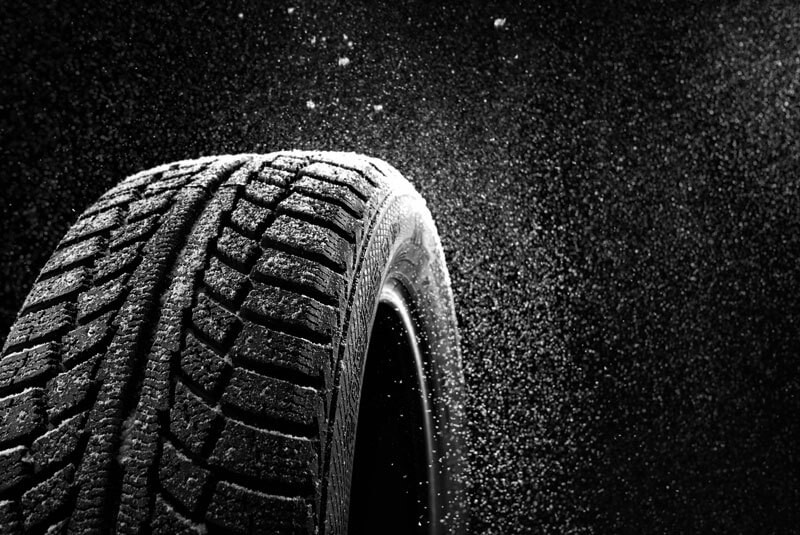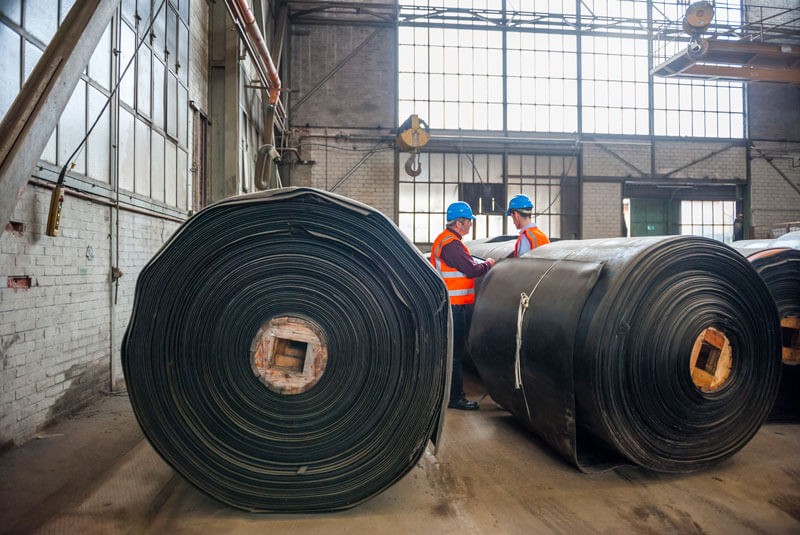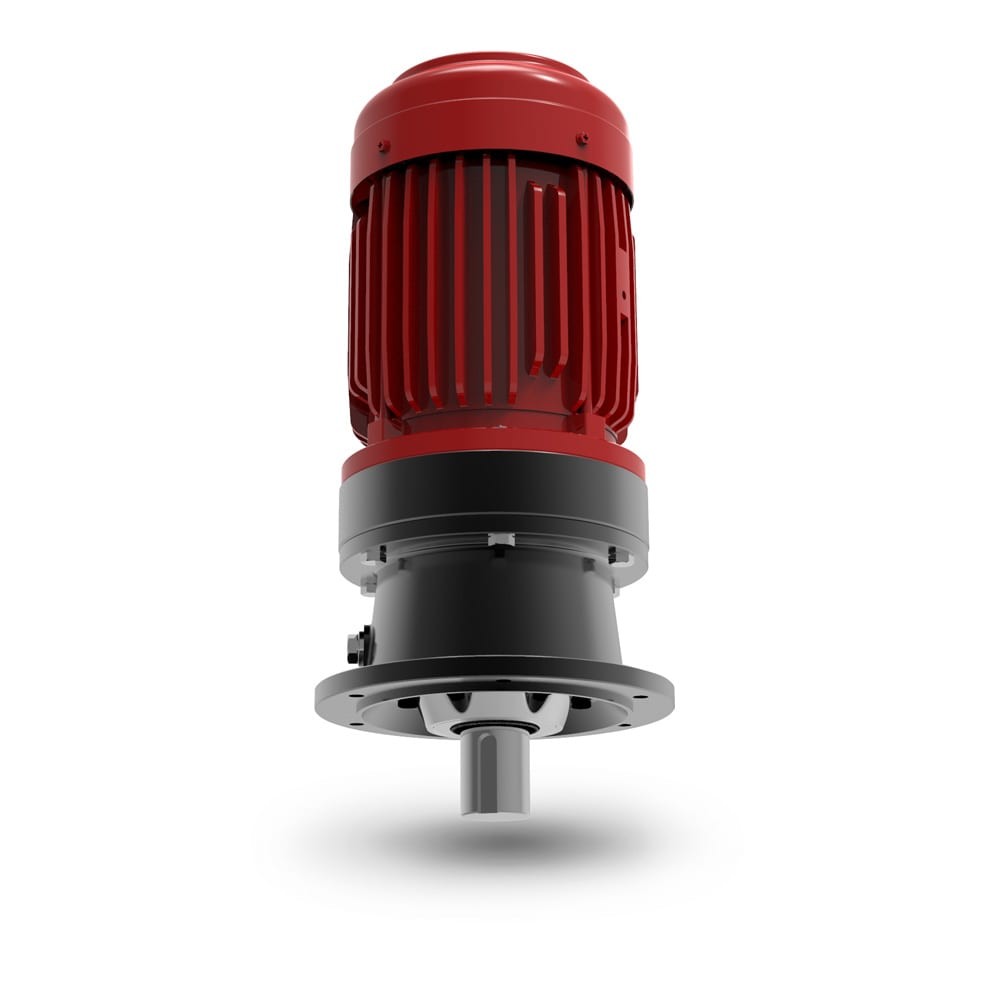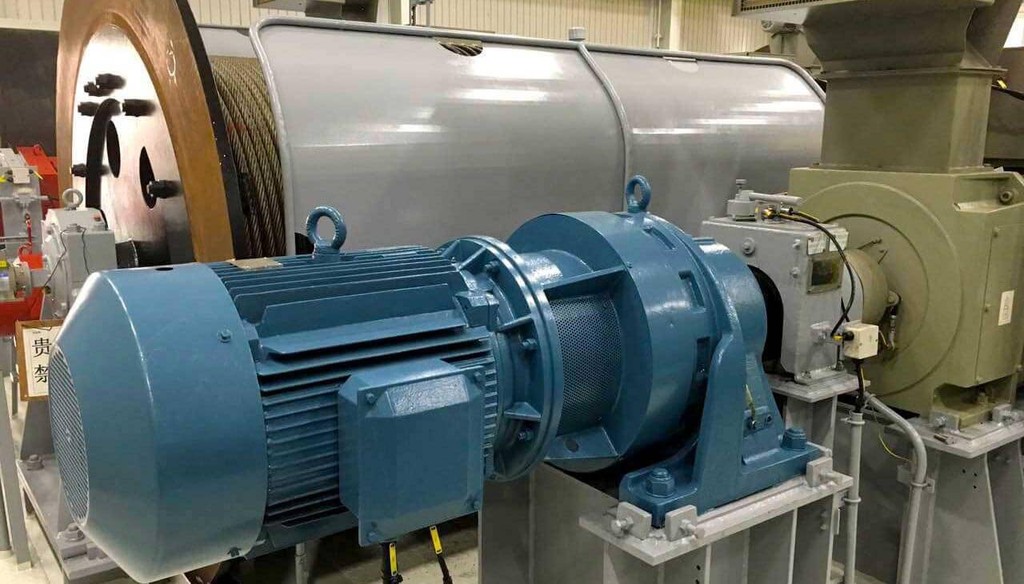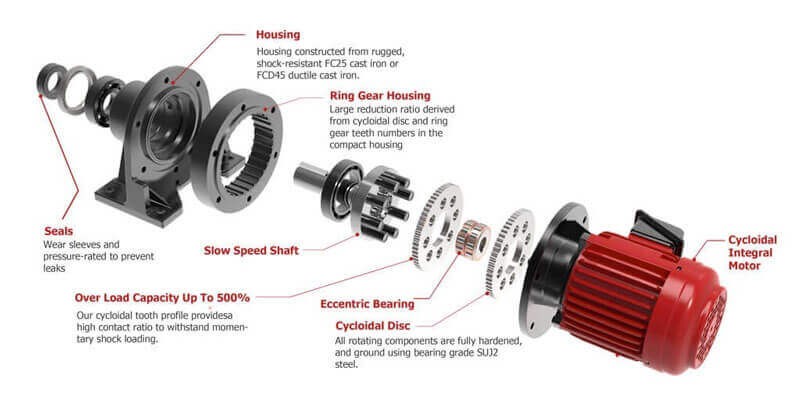Cyclo Drives For Rubber Industries
Reliability and minimized downtime make cyclo drives standard equipment in the rubber manufacturing and processing industries.
What are the main applications of cyclo drives in the rubber industry?
- Blenders & two roll rubber mills
- Banbury mixers & calender drives
- Conveyors & hoists for material transport
How do cyclo drives support rubber manufacturing?
Cyclo gearmotors, cyclo reducers and derivatives are used as cyclo drives for many different machines used in rubber processing and manufacture from conveyors to tires. Cyclo drives are perfect for blenders, two roll rubber mills, calenders and Banbury mixers used in the rubber and tire industries.
Cyclo drives are designed for the high torque applications commonly found in mixing and processing high density materials. Cyclo drives can also withstand extreme loadings they are perfectly suited to rubber mixing and processing, especially using Banbury mixers, rubber calenders and sheeters. At the other end of the product lifecycle, in tire shredding and recycling, planetary gearboxes are commonly used, but cyclo drives are unrivaled in tire manufacturing for tube presses and tire building because the cyclo design withstands the very high stresses generated in these applications by not suffering from point loading of internal components.
Cyclo drives offer extreme reliability
In any industry where machinery needs to operate continuously with very high reliability and long mean times between failures, cyclo drives can make the difference between making a profit and running at a loss.
Predictable wear patterns and resistance to failure make it easy to plan maintenance intervals around production schedules when you use cyclo drives. If you want to increase your peace of mind in rubber manufacturing, a simple solution is to use cyclo drives and gear reducers wherever possible.
When are cyclo drives used in rubber manufacturing?
- Creeper / mangles
- Rubber mills
- Dry pre-breakers
- Wet pre-breakers
- Banbury mixers
- Rubber calenders
- Material Transport
- Tire & tube press openers
- Tire tubers & strainers
- Tire building machinery
- Elevators
- Conveyors
Making Transcyko cyclo drives and cyclo derivatives your stress-free choice instead of conventional drives and reducers increases site and manufacturing reliability for rubber mixing and product manufacturing.
What are the benefits of using cyclo drives for rubber manufacturing?
- Cyclo drives are compact & versatile
- Efficiency increases with input speeds
- Standardizing drives simplifies management and maintenance of site machinery
Cyclo drives are versatile, compact, powerful & efficient
Linear drives and gearboxes create concentrated point loads on individual shafts, gears, and drivetrain components. This makes it necessary to use heavier gears and shafts to withstand shock loadings. A shorter cyclo drive has the same performance as a much bigger, more expensive, conventional gearbox.
The small size and ruggedness of standard cyclo drives makes them a logical choice for multiple applications across a work site. Often a single model of cyclo drive can be used to drive many different machines, enabling hot-swapping for maintenance, and significant savings in spare part inventory management.
Transycko cyclo drives are especially versatile, designed to by cross-compatible with other leading cyclo drive manufacturers. Our products can be used as a direct replacement for Sumitomo drives in almost all applications. We also offer responsive and cost-effective spare parts and servicing for other brands of cyclo drive. As well as offering high reduction ratios, cyclo drives show increased efficiency at higher input speeds. This makes cyclo drives a more effective and lower cost solution than conventional drives because of their reduced energy consumption and smaller footprint.
Selecting the right cyclo drive for rubber industry applications
How do I select a cyclo gearmotor?
Selecting the right cyclo gearmotor is based on motor horsepower and/or required torque measured at the output shaft. Cyclo gearmotors are very efficient over a wide range of reduction ratios. This often means that input power can be reduced, requiring a motor with a lower HP rating, without losing output shaft torque.
What information do I need to select a cyclo drive?
- The application: what type of machine is being driven
- Expected daily hours of operation
- Motor horsepower (HP) and speed (RPM)
- Mounting type: vertical, horizontal, right-angle…
- specialized requirements including environmental exposure as this will be useful in determining specific casing and construction details
How are service classes used for cyclo gear motors & cyclo drives?
AGMA-defined Service Classes are applied to rate cyclo gearmotors for defined operational loading conditions. AGMA Service Classifications for gearmotors are: uniform (I), moderate shock (II), and heavy shock (III). These classifications enable you to fit your product selection to specific tasks.
It is important to check the AGMA Class recommendations of your installation to ensure you match your drive choices correctly, especially when using non-cyclo gearboxes. Using an AGMA Class I or II planetary gearbox for an AGMA Class III operation will almost certainly result in rapid, and sudden, equipment failure.
What are the AGMA classes for rubber manufacturing?
In the rubber manufacturing industries, AGMA Service Class II is commonly found, subject to moderate shock loadings. Some general service equipment may be AGMA Service Class I. AGMA Service Class III is usually specified for two high load applications:
- Rubber mixers
- Tire building machines, tire & tube press openers
1. Rubber mixers
In the rubber industry, mixers and calenders are usually AGMA Service Class III because of the high viscosity of rubber compounds. This requires extremely shock resistant drives to withstand the forces generated in rubber mixing.
2. Tire building machines, tire & tube press openers
AGMA Class III may be specified in tire manufacturing for larger installations and bigger tire sizes where Class II is insufficient. The superior performance of cyclo drives makes it cost effective to use Class III as a standard, ensuring longevity and reliability.
Common questions about cyclo drives and gear motors
How much shock loading can a cyclo gear motor withstand?
Cyclo drives and gearmotors will withstand intermittent momentary shocks of 500% of their rating due to their shared load design. Conventional gearboxes may exhibit sudden shaft or gear failures at shock loads over 300% of rating. Our technical team can design custom cyclo drives that will exceed 500% overload for specialized applications in rubber manufacturing.
What are standard cyclo drive input speeds?
Stock cyclo motor speeds are 1750 and 1165 RPM at 60hz, which equates to 1450 and 980 RPM at 50Hz. Non-standard input speeds need to be calculated to determine how they affect horsepower and torque ratings. Our technical team is always happy to discuss any requirement.
Do cyclo drives have thermal capacity limitations?
The almost frictionless operation of cyclo drives leads to a thermal rating that is usually beyond the mechanical capacity of the drive. Cyclo drives are not affected by conventional heat limitations even under heavy working conditions because the drive shares the load between components.
What inverter turn-down ratio is available?
Unbraked motors have a 10:1 standard ratio. Depending on power rating, braked motors may be restricted to 4:1 or better. C-face configurations are available with a 1000:1 ratio.
Key Features of Transcyko 600 Series Cyclo Drives
- Wear sleeves and pressure rated seals ensure excellent sealing of the cycloidal drive even in harsh conditions.
- Casings constructed of rugged, shock-resistant FC25 cast iron or FCD45 ductile cast iron.
- Reduction gearing is contained in a compact ring gear housing for high power density enabling large reduction ratios.
- Fail-safe service as stresses are shared across 60% of component parts during operation, compared to 5% or less for conventional drives.
- Rotating components are vacuum degassed, hardened bearing grade SUJ2 steel for consistent and reliable performance.
- Output shafts can be customized to any size or material requirement.
- Overload capacity withstands momentary shock loads of up to 500% of normal operational range.
The Transcyko solution for all your cyclo drive requirements
Internal batch mixers used for rubber manufacturing can be difficult to clear and restart, because the mixture is very dense, resulting in loss of production. This is why it is essential to use very reliable gearboxes and motors in Banbury mixers and other batch mixers used in rubber manufacturing.
Transcyko cyclo drives are a highly competitive direct replacement for Sumitomo gearboxes in rubber mixers and general cyclo applications. We also manufacture and supply parts for repair of Sumitomo gearboxes for customers who use Sumitomo products.
Why use Transcyko for your gearboxes, drives & speed reducers?
- We are a one-stop supplier for all types of gearboxes, drives and speed reducers
- We can service and supply parts for other leading brands
- We offer rapid maintenance and service support
Transcyko manufactures a wide range of gearboxes, drives & reducers
Transcyko customers can meet all their gearbox requirements from a single source because we produce such a wide range of reliable, high performance gearboxes, drives and speed reducers. Our friendly and responsive customer service team are always on hand to help with enquiries.
- Cycloidal (cyclo)
- Planetary gearboxes
- Gearboxes for plastics
- Travel motor gearboxes
- Gearboxes for automation systems
Contact us today to see how we can supply cyclo drives that meet your rubber industry manufacturing requirements. We can help you to reduce costs, increase reliability and add value to your production.
